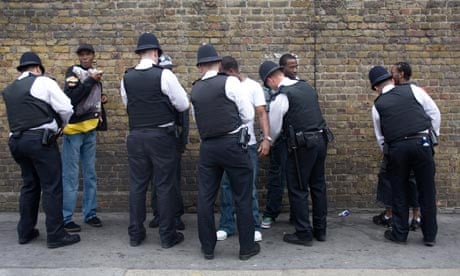The disclosure that as many as 51 allegations of racism were made to the Metropolitan Police Service (MPS) in the two months after 1 April should come as no surprise to anyone who is familiar with the Met's track record of institutional racism. It is difficult for a leopard to change its spots just because a Lord says it should. If the period from April to June is representative of a general trend, this may mean that we'd be looking at an average of over 200 complaints per year, which in itself would only be the tip of the iceberg. As with all aspects of racism, the real figure is certainly a lot higher.
The term "institutional racism" was always a very generous term from the outset. It allowed senior management to claim that there was little or no direct racial discrimination. The reality has always been different. Human beings sadly do differentiate on grounds of race, gender and class in making their everyday decisions. The police are no exception to this general behavioural tendency, but the danger is that given the pressures of their jobs, mere racist prejudice is more likely to result in racist actions than with other members of society.
Police officers have overlooked the development of a culture in which being African Caribbean, and more recently Asian and Muslim, was of itself a cause for suspicion. The disparity in the MPS stop-and-search figures, exceeded only by the Solicitors Regulatory Authority (SRA) in disciplining rates for black and minority solicitors, suggests a deep cultural psychosis.
The reaction of senior management today is to scramble to deny the problem, and is a widespread one reminiscent of the "few bad apples" comments made famous years ago by former commissioners defending the MPS. The mayor of London, Boris Johnson, who himself paid a less than keen interest in anti-racism while editor of the Spectator magazine, permitting racist articles by the journalist "Taki" not only to be published but also to remain online for several weeks, was himself subject to an investigation by the MPS that was referred to the Crown Prosecution Service.
Johnson recently claimed that "we've moved on" from the term "institutional racism", first defined by the Macpherson report, adding that "I think great progress has been made but there is more to do". This strongly suggests he fails to grasp the seriousness of the issue and warrants some analysis as to who the "we" are. The mayor may have been referring to white people in power and authority like himself and his former deputy mayor Kit Malthouse, which would explain why so few of the recommendations of the Race and Faith report of 2010 still had not been implemented.
Racism flourishes when permitted to do so. There is clear evidence that the leadership of the MPS, which is still horribly white, these days does not have race central to its core business objectives to eradicate or reduce. Words of condemnation are no substitute for action. The actions against racism are far less vigorous in practice.
In its wider responsibility neither the mayor of London nor the MPS sought to maintain the work of the London Race Hate Crime Forum organised under the former Metropolitan Police Authority. This body, which was able to scrutinise hate crime on a borough basis, was effective in increasing the sanction detection rate of hate crime, doubling up from a low of 19% to 38% in 2008. Yet it was effectively abandoned and the responsibility returned to the old system, which always lacked effective scrutiny and accountability – despite the fact that in London last year there were over 8,000 racist incidents reported to the MPS as compared to 10,000 reported some three years ago. This is almost certainly an indication that the general public has less confidence to report racist incidents to the MPS than it did some years ago. It almost certainly does not mean that racist incidents have fallen by 20% in the last three years, as some would suggest.
There is inevitably a synergy between the fight against race and religious crime and the internal problem of the MPS. Black and minority communities are less likely to join an organisation seen as soft on race and the same community will think long and hard before reporting racist incidents to a police force with a racist ideology among a significant minority. The real answer lies not in the one officer who utters racist comments but in his colleagues who pretend not to hear. That is the culture that has to change.
